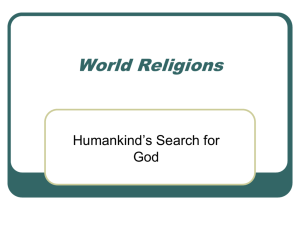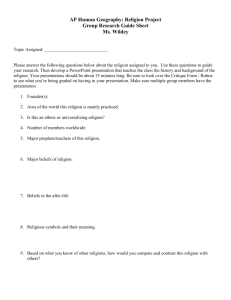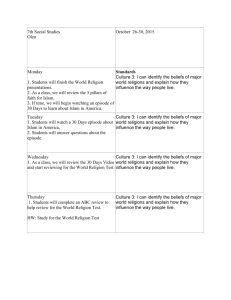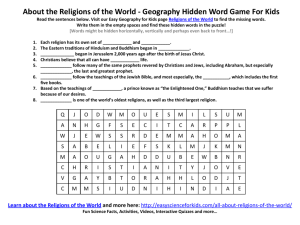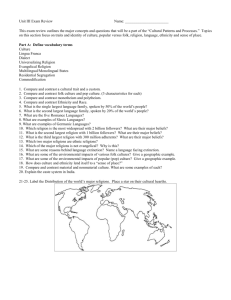World Religions
advertisement
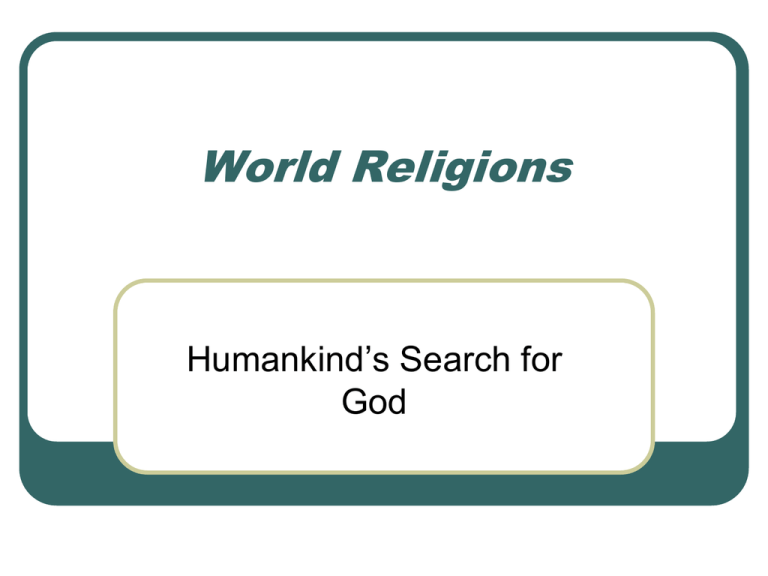
World Religions Humankind’s Search for God The Big Question What is the link between a golden temple in India and a huge red rock in central Australia? What does a totem pole in British Columbia have in common with a stone circle in the south of England? Why do millions of people every year journey to a church in Rome, a wall in Jerusalem, a river in India, and a black cube in Mecca? What theme do countless songwriters turn to when they need a song that will connect with millions of people? Bon Jovi: ‘Livin on a Prayer’ U2: ‘If God will send His Angels’ Led Zeppelin: ‘Stairway to Heaven’ Beach Boys: ‘God only Knows’ George Harrison: ‘My Sweet Lord’ I Still Haven’t Found What I’m Looking For - From U2’s The Joshua Tree I have climbed highest mountain I have run through the fields Only to be with you Only to be with you I have run I have crawled I have scaled these city walls These city walls Only to be with you But I still haven't found what I'm looking for But I still haven't found what I'm looking for I have kissed honey lips Felt the healing in her fingertips It burned like fire This burning desire I have spoke with the tongue of angels I have held the hand of a devil It was warm in the night I was cold as a stone But I still haven't found what I'm looking for But I still haven't found what I'm looking for I believe in the kingdom come When all the colors will bleed into one Bleed into one Well yes I'm still running You broke the bonds and you Loosed the chains Carried the cross Of my shame Of my shame You know I believed it ??? The answer to all of these questions involves one word – religion, a phenomenon common to all people in all times. According to the dictionary, religion involves "belief in and reverence for a supernatural power or powers regarded as creator and governor of the universe." It is "a personal or institutionalized system grounded in such belief and worship.” Simply put, all religions celebrate a sense of the sacred in life. Origins of Religion Religion is as old as humankind. Since the beginning, human beings have looked to powers outside of themselves for protection and reassurance. These beliefs predate the written word, so we must look to archaeological finds for evidence of these ancient religious beliefs. Of course, we cannot know exactly what these beliefs were, but we can theorize. Examples: Neanderthal Man (60,000 BC) • Burial sites with animal antlers on the body and flower fragments next to the corpse. Cro-Magnon Man (35,000-10,000 BC) • Buried with food, shells, necklaces of deer • teeth, fine skin clothes, and good tools. Dead also covered in red earth to look like newborns. Good indication that they believed in rebirth after death – an afterlife. Religions Throughout History Every culture throughout history has had their own religion and their own rituals of worship. Some of these religions such as those of the ancient Egyptians, Greeks and Romans, as well as those of the Incas, Mayans and Aztecs - are no longer practiced, but are remembered through their architecture (temples, pyramids, etc.) and their literature (mythology). Religions Today Other religions such as Hinduism, Judaism, Buddhism, Christianity, and Islam, started thousands of years ago and continue to be vibrant and relevant in our world today. What Characterizes a Religion? Most scholars agree that every religion has the same three basic elements: creed, cult, and code (sometimes referred to as word, worship, and works). Others will add two more to the list: canon and community. On the following slides, we will consider what these words mean. Creed (word) Refers to the theological beliefs of a religion. A creed is a set of truths that MUST be accepted and assented to by those who wish to belong to a given group or to be a follower or disciple. Briefly, a creed is no more than a "summary" of the principle beliefs of a religion. What do we call our principle creeds in Christianity? Cult (worship) Refers to the way of worshipping, to the rituals that are practiced by followers of the religion. This is often a difficult element to describe, because it involves so many diverse elements. Code (works) Refers to the ethical values and the system of moral practice directly resulting from an adherence to the beliefs or CREED. It is a set of moral principles and guidelines that must be respected and followed by those who would be identified as members of the religion. A code, when used in a religious sense, is simply a summary of the principles and guidelines by which people choose which actions are good, and which to be avoided. These three elements (Creed, Cult, and Code) fulfill the three parts of the human soul: thought, feelings and action; mind, sensibilities and will; the intellectual, the aesthetic and the moral. Canon Refers to the scriptures, or holy writings of a religion. Generally, the CREED is grounded within, these writings. Community is the organization within the religion which is designed to help the members observe the beliefs. The Nature of Religious Tradition Most religions try to answer the same fundamental questions. Most religions have a number of basic elements such as doctrines, sacred stories, and rituals. Fundamental Questions Not everyone chooses to answer fundamental religious questions by adhering to religious traditions. Some people understand themselves to be ‘spiritual,’ but do not consider themselves ‘religious.’ Question 1 Are we good by nature, or are we evil? Question 2 Why do we suffer? Question 3 What is salvation? Question 4 How do we overcome the limitations of the human condition? www.dmbowers.com/.../human_condition/index.html Question 5 What is our destiny, why are we here? reallygoodwebdesign.com.au/ Question 6 What is right, what is wrong? Question 7 What is the nature of the world? http://www.allbestwallpapers.com/digital_(3d)-soul_existence_wallpapers.html Question 8 Is there a God? http://www.godtalkstoyou.com/God%20Talks%20To%20You%20Picture%20JPG.JPG Studying World Religions Hinduism Buddhism Jainism Sikhism Confucianism Baha’i Taoism Zen Buddhism Shinto Judaism Islam North American Lakota Scientology Jehovah’s Witness Mormonism http://signsofthelastdays.com/wp-content/uploads/2009/09/One-World-Religion.jpg

